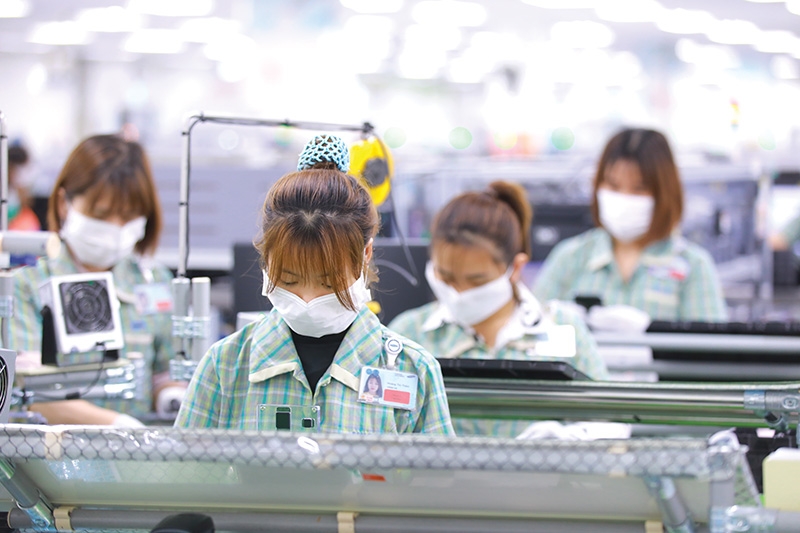South Korean investment ties aided
 |
| Of all South Korean investors active in Vietnam, Samsung contributes the most to the country’s GDP |
South Korean Ambassador to Vietnam Park Noh-wan spoke at the first ROK-Vietnam strategic dialogue, titled ROK-Vietnam Relations: Deepening the Strategic Co-operative Partnership organised in Hanoi last week, and said that his nation and Vietnam have succeeded in reining in COVID-19, and a new co-operation framework needs to be worked out, so that both nations can further enhance their existing strategic partnership forged in 2009.
Now would be the time for both nations to elevate their relations to a comprehensive strategic partnership, South Korea’s Yonhap cited the ambassador at the dialogue.
During Prime Minister Nguyen Xuan Phuc’s official visit to South Korea last November, President Moon Jae-in stressed that Vietnam is “a key partner in South Korea’s New Southern Policy”, and that “South Korea wishes that both nations continue boosting bilateral ties to a new height.”
However, the Vietnamese side has yet to reveal any plan to reach such a comprehensive strategic partnership, in which bilateral co-operation will cover all sectors, especially trade and investment. If it comes true, both nations’ investment and trade ties will have a more solid foundation to further flourish because more favourable conditions could be created for the trade and investment flows in both directions.
Figures from the Vietnamese General Statistics Office showed that as of June 20, South Korea had about 8,830 valid investment projects in Vietnam, registered at $68.3 billion, making South Korea the biggest foreign investor in Vietnam. Of all South Korean companies, Samsung is the largest in Vietnam, with total registered investment capital of over $17 billion for various projects and over 160,000 local employees. The group is constructing a $220 million research and development centre in Hanoi, which is expected to become operational in 2022, employing another 2,200-3,000 people.
“Samsung Electronics’ exports account for 25 per cent of Vietnam’s total export turnover and 28 per cent of the country’s GDP,” reported the South Korean Embassy in a statement at last week’s dialogue.
To facilitate bilateral relations, Vietnam will likely resume some air routes between both countries at a limited level from this week, said Nguyen Vu Tung, director of the Diplomatic Academy of Vietnam, at the dialogue, who will soon become the Vietnamese Ambassador to South Korea.
Two weeks ago, Ambassador Noh-wan met with Vietnamese Minister of Finance Dinh Tien Dung, discussing Vietnam’s equitisation of state-owned enterprises and the possibility for both nations to develop their co-operation in finance, public-private partnerships, customs, and tax exemption for enterprises.
It is expected that a direct dialogue on tax and customs policies between the Vietnamese government and South Korean businesses will be organised over the next few months.
“This is aimed to support businesses of the two nations as they are now in big difficulties,” Noh-wan said.
Hong Sun, vice chairman of the Korea Chamber of Business in Vietnam told VIR, that South Korea’s investment in Vietnam will continue rising strongly in the time to come. At present, South Korean investors in Vietnam are active in three ways, producing export-oriented products, developing infrastructure and property, and conducting mergers and acquisitions.
“They are looking for opportunities in all sectors of Vietnam’s economy, such as finance and banking, electronics, construction, energy, retail, property, foodstuff, and agriculture,” Sun said.
According to the Korea Wealth Report 2019 published by private financial think tank KB Financial Group Research Institute, Vietnam is the most preferred country among wealthy South Koreans looking to make overseas real estate investments.
Notably, over 50 per cent of South Koreans with assets worth over ₩1 billion ($850,000) expressed interest in overseas real estate investments. Of these, 57.1 per cent said they wanted to invest in Vietnam, followed by Singapore (32.1 per cent), China (30.7 per cent), and Malaysia (26.4 per cent).
What the stars mean:
★ Poor ★ ★ Promising ★★★ Good ★★★★ Very good ★★★★★ Exceptional
Related Contents
Latest News
More News
- Kurz Vietnam expands Gia Lai factory (February 27, 2026 | 16:37)
- SK Innovation-led consortium wins $2.3 billion LNG project in Nghe An (February 25, 2026 | 07:56)
- THACO opens $70 million manufacturing complex in Danang (February 25, 2026 | 07:54)
- Phu Quoc International Airport expansion approved to meet rising demand (February 24, 2026 | 10:00)
- Bac Giang International Logistics Centre faces land clearance barrier (February 24, 2026 | 08:00)
- Bright prospects abound in European investment (February 19, 2026 | 20:27)
- Internal strengths attest to commitment to progress (February 19, 2026 | 20:13)
- Vietnam, New Zealand seek level-up in ties (February 19, 2026 | 18:06)
- Untapped potential in relations with Indonesia (February 19, 2026 | 17:56)
- German strengths match Vietnamese aspirations (February 19, 2026 | 17:40)

 Tag:
Tag:




















 Mobile Version
Mobile Version